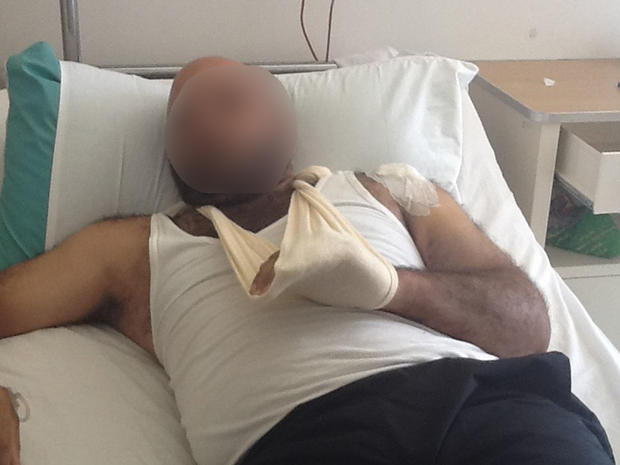Syria rebel lives double life as government employee, FSA bomb-maker and commander
This story was filed by CBS Radio News correspondent Toula Vlahou
(CBS News) TRIPOLI, Lebanon - At first, the man with the bullet wound was reluctant to speak to us.
Then, in a rush of words, he began to tell of his double life in Syria.
"I was a member of the Ba'ath Party," Housam told CBS News from his hospital bed in Tripoli, northern Lebanon, referring to the party and the government of Syrian President Bashar Assad. Housam arrived clandestinely to Tripoli a few days earlier, to have a bullet removed from his left shoulder.
He was shot, he says, in a battle fighting as a local commander for the rebel Free Syrian Army - the forces trying to topple the man he purported to work for and be loyal to in his day job.
Syria gov't claims gains in AleppoSyrian troops shell Aleppo neighborhoods
Maj. Gen. Mood: Syria regime could crumble soon
For 13 months, Housam led parallel lives in western Syria, near the central province of Homs. His hometown came under intense siege from the Syrian Army for months this spring, and Homs is considered one of the strongholds for the opposition in the now-17-month-old conflict.
"I worked for the Assad government in the day and at night I would fight with the rebels," he explains proudly from his hospital bed. "I was elected to my position (in the government) twice," he adds, smiling broadly and over the ruse he was able to maintain for so long.
"I am not afraid," proclaims Housam, who was happy to have his full name, even his hometown given with his story. CBS News has chosen not to disclose his full identity, due to the potential risk to his family still inside Syria.
"I've been fighting from the beginning. My mission was to protect the Al-Hosn castle and the people around it," he says, referring to a 1,000-year-old structure that he claims Assad's forces have already bombed.
Because of his government position, he had a hand in doling out government loans and other help that went to farmers in the area, Housam says through a translator.
As Housam tells it, his position allowed him intimate knowledge of how Assad's Ba'ath party worked, and he rebelled against the system because of what he saw.
"I didn't like how Assad treated civilians, and there was discrimination," he said, adding that most of the agricultural-related help was directed to the minority Alawites - Assad's own sect of Islam, which is a minority in Syria.
"Little went to Sunnis," says Housam. Sunni Muslims represent the majority in the Homs area, and in the nation as a whole. The perceived neglect by the government has been one of the primary factors driving Syria's Sunnis, including Housam, to take up arms against the regime.
Like most information coming out of Syria, it is difficult to verify Housam's story. Some of the details and accounts of events he offers do, however, match independent reporting.
Housam says he commanded a 20-man unit defending the castle against the barrage of fire from government helicopters and tanks.
His specialty, he says, was IEDs, or improvised explosive devices, that were used along with just two machine guns and some rocket-propelled grenades to defend their position at the 11th century castle, which is listed by UNESCO as a site of "outstanding universal value."
"I became an expert at making explosives," Housam says. When asked where he found the substances to make the explosives, he says they were materials readily available at the local pharmacy.
Housam says he was wounded after he removed a Syrian national flag from a house taken over by government forces.
"As we were running away, I was shot."
Injured and bleeding, Housam made it to the nearby border on the back of a motorcycle driven by a fellow rebel. Getting treated at a Syrian hospital was out of the question - it would have meant certain capture.
"He took me close to the border and then I snuck across on foot."
The rebels have carved out secret routes across Syria's border with Lebanon, which is patrolled by the armed forces from both countries, but has become a frontline in the deadly struggle between the regime and the opposition.
Official crossing points have been closed by Syrian authorities to prevent the rebels from taking them over, as they have done on the borders with Iraq and Turkey.
Housam used one of the secret routes to make it across to Tripoli, a bustling coastal city which has its share of conflict. Buildings on each side of the city's Syria Street bear the evidence: pockmarks left by bullets from clashes between pro-Assad and pro-rebel forces as the violence of the civil war has spilled across the border.
Using an underground network relying on cell phones, Facebook and Skype, Housam found his way to a Tripoli hospital.
Laying in his bed with his shoulder bandaged, and knowing he is now a wanted man, Housam tells CBS News that when he recovers, he will return to the battle and defeat Assad's regime.
